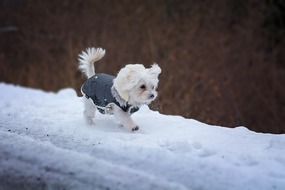10 Ways to Keep Your Pets Warm and Safe During Winter
 Although autumn has lasted much longer in the Rocky Mountain states than usual, including some highs in the 50s during Thanksgiving, we all know winter is on its way – and in some places has already blasted in. The cold season brings potentially harmful issues for our pets, from frostbite to poisoning.
Although autumn has lasted much longer in the Rocky Mountain states than usual, including some highs in the 50s during Thanksgiving, we all know winter is on its way – and in some places has already blasted in. The cold season brings potentially harmful issues for our pets, from frostbite to poisoning. Below are ten ideas to help keep your pet warmer and safer during the winter months:
Consider coats. Short-haired dog breeds or older animals may need a coat to wear outside while on a walk. No one likes feeling like an icicle, including our beloved pets, so if you have a dog that's affected by colder temperatures, provide an extra layer of warmth in the form of a coat. Also, it's not a good idea to shave your pet to the skin during the winter months – the animal's fur helps insulate it from the harsh winter weather.Buy booties. The pads of a pet's feet can become frost-bitten if they are outdoors for too long. Ice, snow, and icemelt can also be picked up while outside. Many mushers and other dog owners use booties specifically made for dogs to protect their paws; you, too, may find those beneficial for your pet.
Don’t lose it. Dogs shouldn’t run off-leash while outdoors unless in a secured fence, especially during a snowstorm. Dogs often rely on scent to find their way, and they can lose that scent easily in snow and wind. According to the ASPCA (American Society for the Prevention of Cruelty to Animals), more dogs are lost during winter months than other times of the year.Wear updated ID. Make sure your pets have ID tags and/or microchips with current owner information so they can be returned home if they do become lost.Make areas warm. Create a cozy place for your pet to sleep, if they sleep inside the house or in a kennel in the backyard. If you have outdoor animals, provide them with a strong, warm shelter, including straw for inside the barn or doghouse. If your pets live indoors, a snug bed keeps them warmer and is more comfortable than the hard, cold floor.Dry off. When your dog is bathed, make sure he is completely dry before going outdoors.Clean the coat. When returning home from a walk, clean your dog’s paws, legs and stomach area. Your pet can ingest anti-freeze, salt, and other harmful chemicals if he’s allowed to clean himself.Keep pets from poisons. Anti-freeze poisons to pets, so keep your pets away from it. Keep kitty inside. It's best to keep your cat indoors during the winter. Cats can freeze, become lost, or contract a deadly disease such as rabies when outdoors in winter. Additionally, many people feed wild birds during this season, and cats can be deadly on these lovely wild things that others are not only caring for, but also enjoy watching at the feeders.Check the car engine. Cats often climb into the engine compartments of vehicles to stay warm, therefore, prior to starting your car's engine, bang on the hood to scare away any potential stowaways. Fan belts seriously injure, even kill, cats and other small animals that crawl into the engine area. Some even huddle in the wheel-well, so do a thorough check of your car before pulling away.
Putting these guidelines into action will help keep your four-footed companion warmer and safer during these chilly winter months.

Published on November 29, 2016 06:00
No comments have been added yet.



